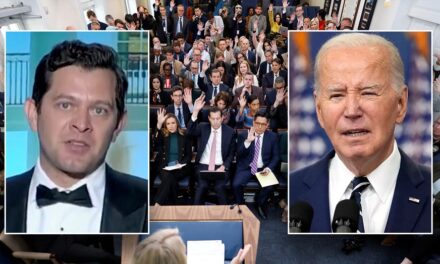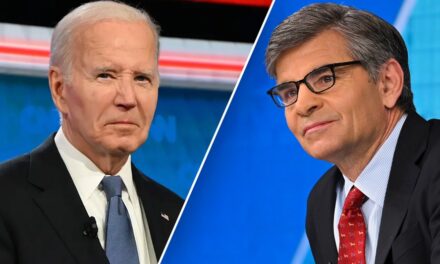In a recent discussion, an editor from The Atlantic expressed confusion regarding the media’s longstanding portrayal of President Joe Biden’s health. This discussion taps into a broader conversation about how news outlets shape public perception regarding political figures, particularly concerning their health and well-being.
President Biden, who took office in January 2021, has faced scrutiny about his age and health, becoming a focal point for both supporters and opponents alike. The President, now in his early 80s, has been involved in various public appearances, and while many Democrats rally behind him, the Republican narrative often paints a different picture. Biden’s age has frequently been a topic in political commentary, with various media outlets weighing in on the implications this has for his capability to govern effectively.
The Atlantic editor questioned the narrative that suggests the media has consistently painted a negative picture of Biden’s health. While some may argue that this portrayal is warranted due to substantive concerns, he pointed out that it might be misplaced, raising questions about the motivations behind such narratives.
Analysts suggest that the emphasis media outlets place on Biden’s age and health issues often overlooks the fact that he has effectively managed many issues facing the country, including foreign policy and domestic challenges. Despite these accomplishments, the public discourse surrounding his health tends to dominate news cycles, overshadowing his policy decisions and leadership attributes.
A key point of contention in the debate is whether the media’s focus on Biden’s health is driven by genuine concern for the President or if it serves other purposes, such as eliciting ratings or political gain. The Atlantic editor’s comments hint at a belief that perhaps the media has over-exaggerated certain aspects of Biden’s health, suggesting there may be a disconnect between reality and how these narratives are presented.
This phenomenon is not unique to Biden. Historical context reveals that concerns about a president’s health have impacted public perception and trust. Past presidents have also faced similar scrutiny, often resulting in media speculation that may not reflect the actual health realities. For instance, President Franklin D. Roosevelt’s health was a closely guarded secret for most of his presidency, yet his struggles were scrutinized, leading to public concern and political speculation.
The Atlantic’s editor emphasizes the need for a more nuanced understanding of Biden’s situation, one that separates unfounded speculation from factual reporting. He acknowledges that while transparency concerning a sitting president’s health is crucial, it is equally important for media coverage to strike a balance, focusing on substantial matters that impact national interests rather than sensationalized narratives.
The skeptical media portrayal has arguably caused a ripple effect impacting the Biden administration’s overall public perception. With every health-related question that arises, critics are quick to suggest that he may not be fit for the role he holds. Furthermore, this coverage has fueled partisan divisions, with proponents on both ends of the political spectrum using health discourse to bolster their arguments for or against his presidency.
As the 2024 election draws closer, Biden’s health and age will likely continue to be a pressing issue. Republicans have indicated they will leverage this narrative in an attempt to sway undecided voters. Meanwhile, Democrats will focus on highlighting Biden’s achievements and the strengths he brings to the table, effectively countering the negative implications of such health debates.
The Atlantic editor’s comments have sparked dialogue among journalists and political analysts, suggesting that a revision in how health narratives are covered could lead to a more informed electorate. Critics point towards the need for media organizations to reassess their approach, ensuring that coverage reflects the truth rather than speculation driven by partisan motivations.
Additionally, the special focus on health can detract from meaningful discussions on policy and competencies. Analysts argue that voters should prioritize a candidate’s policies, vision, and integrity over personal health narratives. Society must remain cautious about how easily these narratives can sway opinions, particularly when they may not necessarily align with an individual’s ability to govern effectively.
It is also vital to acknowledge the demographic of voters who may hold differing views on age and health. Younger voters may be less willing to accept characterizations that suggest older candidates should automatically be deemed unfit or incapable. The interplay between age and capability is a complex and subjective issue, encompassing various perspectives shaped by personal experiences, cultural values, and political beliefs.
The current narrative surrounding Biden’s health reflects larger discussions about ageism in politics, questioning whether society tends to favor youth over experience in leadership roles. By continuing to emphasize Biden’s age and potential health issues, media outlets may unintentionally contribute to a culture that undervalues seasoned leadership in favor of younger candidates, without adequate consideration for the wisdom and experience that can only come with age.
Moreover, the media have an essential role in shaping public dialogue. As discussions about Biden’s health continue to unfold, the responsibility lies heavily on the media to differentiate between legitimate concerns and sensationalistic storytelling. In performing this duty, journalists can help ensure that informed analyses prevail over conjecture and smear tactics, preserving the integrity of public discourse.
As we navigate this politically charged environment leading into the next election cycle, it is crucial for media outlets to recalibrate their approach regarding narratives about politicians and their health. With evolving standards of political journalism, embracing a balanced and insightful perspective will ultimately serve both the public and the journalistic profession better.
In conclusion, the Atlantic editor’s comments resonate deeply within the context of contemporary politics, provoking thought on the balance between scrutiny and sensationalism in media reporting on health issues, especially regarding a sitting president. As America looks ahead to the 2024 elections and beyond, the discourse surrounding age, health, and political efficacy will undoubtedly remain vibrant, inviting ongoing analysis and reflection from all sides.
































